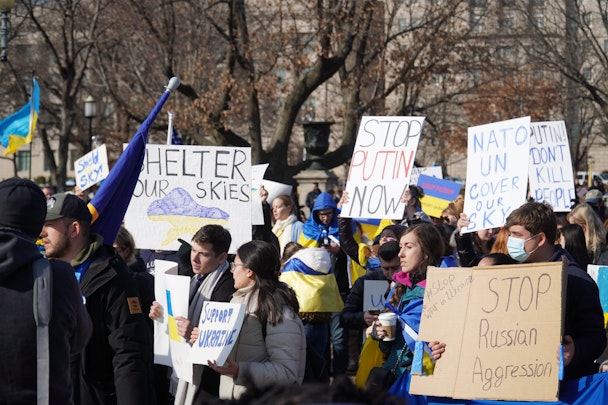Brands are still more trusted than governments, according to Edelman Trust Barometer
From inflation and nuclear war to job loss and climate change, large-scale pressures are affecting individuals and causing a descent from distrust to polarization in society, according to the latest global trust barometer from the PR agency.

Events like Russia's invasion of Ukraine triggered more global uncertainty in 2022 / Unsplash
Now in its 23rd year, the Edelman Trust Barometer surveyed over 32,000 respondents in 28 countries. This year’s results point towards an inherent distrust for government authority, with business now viewed as the only global institution to be both “competent and ethical.”
It also found that economic optimism has suffered a global collapse; half of the countries surveyed saw a year-over-year double-digit decline in the belief that their families will be better off financially in the future.
We break down some of the key findings here.
Advertisement
Trust in business at an all-time high
Businesses now hold a staggering 54-point lead over governments when it comes to perceived competence and 30 points ahead on ethics. This follows from last year’s survey, which pointed to the failure to act over Covid-19 as a key source of distrust for governmental institutions.
“The increased level of trust in business brings with it higher than ever expectations of chief executive officers to be a leading voice on societal issues,” says Richard Edelman, chief exec of Edelman.
“By a six-to-one margin, respondents want more societal involvement by businesses on issues such as climate change, economic inequality, and workforce reskilling. But businesses must tread carefully, over half of our respondents (5%) say it cannot avoid being politicized when it addresses contentious societal issues.”
But Edelman as an organization has faced its own share of skepticism in the past over its refusal to drop major fossil fuel client Exxon from its books.
It was recently revealed that Exxon privately predicted global warming “correctly and skilfully” internally, only to then spend decades publicly denying the scientific evidence behind the connection between fossil fuel pollution and global warming.
Advertisement
Economic optimism is collapsing
This year’s report reveals that trust in the economy has declined globally (50% to 40%), with half of the countries surveyed showing a year-over-year double-digit decline in the belief that their families will be better off in the future.
Furthermore, Edelman says even in countries with a stronger economy, over 35% of its people are not confident that their family will be better off in five years, and 24 of the 28 countries surveyed dropped to all-time lows, including the US (36%), UK (23%), Germany (15%) and Japan (9%).
The PR firm says this has resulted in a mass-class divide, where there is now a double-digit trust gap in three-quarters of the countries surveyed.
High-income earners’ trust in institutions has soared from 50% to 62% over the past decade while low-income earners have struggled, with trust up from 43% to 48%. The most notable national developments in the past three years have been in China (from 4% to 19%) and the UAE (from 10% to 19%), while a 23-point gap in the US and a 37-point gap in Thailand demonstrate the largest divides.
Suggested newsletters for you
Loss of belief in media
The legacy of Covid-19 continues to affect trust in the media, largely due to the ongoing issue of dis and misinformation.
The trend began in earnest during the 2016 US Presidential campaign and the Brexit referendum that same year. 60% of people come into every interaction disbelieving the other person.
However, the pandemic supercharged the disinformation crisis and badly crippled trust in all institutions. Media is now the least trusted of the major four institutions (with business, government and NGOs). Its trust level has declined steadily over the past five years (traditional media from 66 to 58%, social media down from 43% to 38%).
In democracies, fewer than 40% of respondents believe the media to be honest and fair.
We’ve moved from distrust to polarization
As a result, the Trust Barometer finds that one-quarter of the countries surveyed have experienced a shift away from distrust and are now more deeply divided than ever; particularly in the US, Colombia, Argentina, South Africa, Sweden and Spain.
Divisions have become so entrenched and society so highly polarized that respondents believe their differences can no longer be overcome. Globally, two-thirds observe an unprecedented lack of civility and mutual respect in society. As a result, ideology is becoming identity with less than one-third of respondents saying they would help (29%), live with (2%) or work with (20%) someone who strongly disagrees with their point of view.
“We are in a period of huge systemic change in a multi-polar world, with divisive forces fanning economic grievance,” said Dave Samson, global vice-chairman of corporate affairs.
“Left untended, the consequence will be further polarization, slowing economic growth, deeper discrimination and an inherent inability to solve problems. CEOs, and the companies they lead, need to play a central role in addressing these issues and helping restore economic optimism.”

